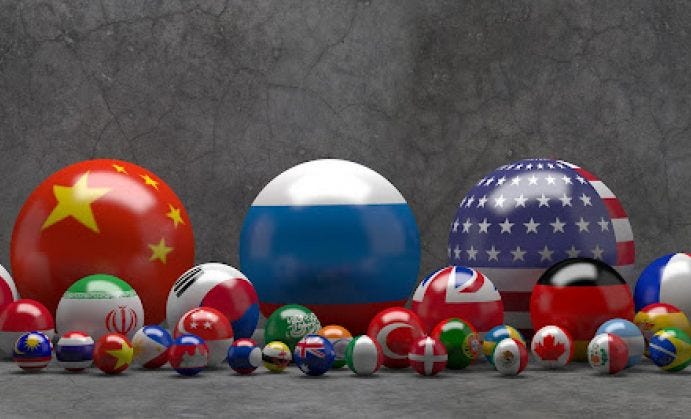THE FALSE ALTERNATIVE BETWEEN UNIPOLARISM AND MULTIPOLARISM
What follows is my English translation of an abridged version of an article by Comidad, published on ComeDonChisciotte.org on 27th May 2024.
(I omitted the first paragraph, relative to Italy and how its government handled the COVID-19 pandemic, as in my humble opinion, is not very relevant to the main topic of the article. - All emphasis mine).
We have become accustomed to the geometric conception of power, seen as a summit that transmits orders and instructions to the base. In reality, power functions more like a rope team, and not even that aligned, since competitive mechanisms and initiatives determine the fait accompli. According to a certain narrative, the 1990s would have been the period of so-called “unipolarism”, i.e. the unchallenged dominance of the only remaining superpower, the United States. Getting into the details, however, one discovers that situations are less unambiguous, and that imperialism works as a two-way street, so it is often the sub-imperialist vague desires of the so-called vassals that determine the shores between which the power at the top of the hierarchy moves. NATO's aggression against Serbia in 1999 was mainly due to the Anglo-American initiative, which was enthusiastically joined by our [Italian] D'Alema government.
On that occasion, the country least enthusiastic about the choice to bomb Belgrade was Germany; yet it was Germany that had started the war on Serbia eight years earlier. When Slovenia and Croatia proclaimed their independence from the Yugoslav federation, it was the Vatican that unsuccessfully promoted the attempt at concerted international recognition; it was, however, the German government that broke the deadlock in January 1991 and implemented the diplomatic recognition of Ljubljana and Zagreb, without in any way conditioning it to a preliminary negotiation with Belgrade to redefine the borders and the rights of any minorities remaining within the new borders. Unilateral and unconditional recognition of a secessionist region is objectively and subjectively an act of war against the country that seceded. One can always assume that, with or without that recognition, the civil war in the former Yugoslavia would have taken place anyway; but the fact remains that Germany's recognition (and money) started the war.
Then Saudi Arabia's money came in and Bosnia was also blown up. Saudi Arabia itself even violated an international embargo to supply arms and other “humanitarian aid” to the Sarajevo government. As the dominant power, the USA profited more than any other from the destabilisation of Yugoslavia and even built its own puppet state to serve as a backdrop to the great military-criminal hub of Bondsteel. But the process was initiated by countries like Germany and Saudi Arabia, who acted for their own interests or according to their own more or less realistic aspirations. US imperialism is the umbrella of a string of sub-imperialisms, whose adventures are not always glorious. At present, the destabilisation of Eastern Europe is presenting Germany with a hefty bill to pay; on the other hand, the competing candidate to supplant Germany in the sub-imperial role in the area, i.e. the Polish-Baltic-Galician complex, appears rather fanciful.
At the micro or macro level, the pattern of power is the same, and it is never ‘unipolar’; hence imperialism works a bit like workplace mobbing, which is often not initiated by the manager, who instead finds the ground already ‘ploughed’ thanks to the work of mafias composed of the victims' colleagues. Today we see Macron trying and struggling to turn the war in Ukraine into his own opportunity for prominence. It was also France, under President Sarkozy, that initiated military operations against Libya in 2011. In NATO's aggression against Libya, an even more decisive role was played by another country, Qatar, which financed the anti-Gaddafi groups and created the media narrative to justify the aggression through Al Jazeera.Gorbachev has often been blamed for not having formalised in writing US commitments not to expand NATO eastwards . These recriminations, however, are meaningless, since in 1972, with the Shanghai Joint Communiqué, the US committed itself in writing to recognising one China, of which Taiwan was considered a part. Today, Washington doesn't give a damn about that solemn declaration, and considers Taiwan an independent country, accusing Beijing of wanting to annex it illegally. On the other hand, it is hard to believe that a Nancy Pelosi or an Antony Blinken actually know how to interact in the Asian context or only understand something about it. Indeed, in recent decades, a decisive role in radicalising the Taiwan issue has been played by Japan, which has repeatedly declared that it regards Taiwanese independence as its own national security problem. Despite the countless occasions on which Tokyo has fanned the flames, many doubt that Tokyo would be willing to lift a finger if conflict with China broke out. The problem in fact is not that; if anything, it is the fact that Japan has used Taiwan as a pretext to implement its rearmament. Thanks to its financial and technological potential, Japan has already become a maritime power again and could even be a nuclear power in no time.
Originally published on Comidad on 23rd May 2024.


